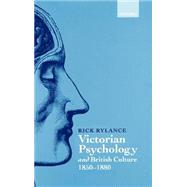Victorian Psychology and British Culture 1850-1880
, by Rylance, Rick- ISBN: 9780198122838 | 0198122837
- Cover: Hardcover
- Copyright: 11/9/2000
Victorian psychology was fiercely controversial and contested by parties representing the whole span of nineteenth-century opinion. It developed from a theory of the soul to one which understood the human mind as a part of the natural world. In its most advanced forms it embraced newevolutionary ideas, and was considered by its opponents to be a bastard child of materialism. But this was a genuinely interdisciplinary field, and bio-medical scientists, philosophers, novelists, poets, theologians, social commentators, and doctors fought for the ascendancy of their ideas. Theemerging discipline reveals the turbulence of Victorian cultural debate, for psychology carried the weight of the periods concerns and articulated some of its most advanced thinking. This book examines psychological theory as it appeared to the Victorians themselves, tracing the social and intellectual forces in play in its formation; it also relates these nineteenth-century ideas to twentieth-century developments in psychological investigation. Part One outlines the generaldebate. Part Two concentrates on three central figures: Alexander Bain, Herbert Spencer, and G. H. Lewes. It assesses their contributions in the context of the public debates which shaped their work. This is the first detailed study of the development of a mature body of complex interdisciplinarytheory often neglected by modern commentators. It also provides one of the first thorough examinations of the work of G. H. Lewes, which has been greatly underestimated. Distinctive features of this study include its cross-referral between work in different disciplines, and a series of analyses of the work of George Eliot, whose writing is saturated with ideas developed alongside those of the great psychologists who formed her circle.







